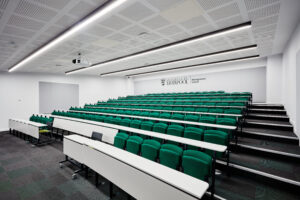How you'll learn
Modules are taught using the latest active learning techniques including business simulations, real-world case studies, social media, interactive participation software, lecture capture and real-time financial and business data using our Bloomberg Trading Floor. The principal forms of teaching are lectures and seminars with lectures normally being supported by material such as hand-outs and presentations.
Seminars give the opportunity for detailed discussion of a topic under the direction of a tutor. You are normally expected to prepare work in advance for seminars and may be expected to present work or give presentations from time to time. On some modules, such as quantitative techniques and IT, seminars may take the form of practical sessions using our PC suites.
All our degrees depend on you spending a good part of the week in private or group study in preparation for lectures and seminars. This involves making extensive use of the excellent library and IT facilities, just one minute’s walk away from the Management School.
How you're assessed
You will be assessed through a combination of coursework and examinations. The exact weighting will vary from one module to another. As well as individual assignments and exams, you may also be assessed on group reports and presentations.
Liverpool Hallmarks
We have a distinctive approach to education, the Liverpool Curriculum Framework, which focuses on research-connected teaching, active learning, and authentic assessment to ensure our students graduate as digitally fluent and confident global citizens.
The Liverpool Curriculum framework sets out our distinctive approach to education. Our teaching staff support our students to develop academic knowledge, skills, and understanding alongside our graduate attributes:
- Digital fluency
- Confidence
- Global citizenship
Our curriculum is characterised by the three Liverpool Hallmarks:
- Research-connected teaching
- Active learning
- Authentic assessment
All this is underpinned by our core value of inclusivity and commitment to providing a curriculum that is accessible to all students.











